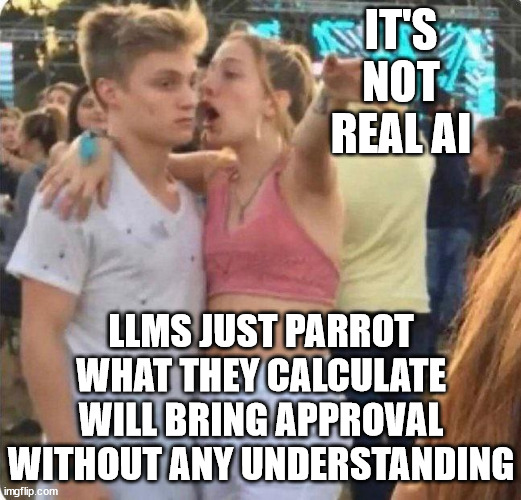this post was submitted on 05 Feb 2024
666 points (87.9% liked)
Memes
53275 readers
1295 users here now
Rules:
- Be civil and nice.
- Try not to excessively repost, as a rule of thumb, wait at least 2 months to do it if you have to.
founded 6 years ago
MODERATORS
you are viewing a single comment's thread
view the rest of the comments
view the rest of the comments

I know the second definition was proposed by OpenAI, who obviously has a vested interest in this topic, but that doesn't mean it can't be a useful or informative conceptualization of AGI, after all we have to set some threshold for the amount of intelligence AI needs to display and in what areas for it to be considered an AGI. Their proposal of an autonomous system that surpasses humans in economically valuable tasks is fairly reasonable, though it's still pretty vague and very much debatable, which is why this isn't the only definition that's been proposed.
Your definition is definitely more peculiar as I've never seen anyone else propose something like it, and it also seems to exclude humans since you're referring to problems we can't solve.
The next question then is what problems specifically AI would need to solve to fit your definition, and with what accuracy. Do you mean solve any problem we can throw at it? At that point we'd be going past AGI and now we're talking about artificial superintelligence..
By your definition AGI doesn't really seem possible at all. But of course, your definition isn't how most data scientists or people in general conceptualize AGI, which is the point of my comment. It's very difficult to put a clear-cut line on what AGI is or isn't, which is why there are those like you who believe it will never be possible, but there are also those who argue it's already here.
That's simply not true. That's the whole point of the concept of generalization in AI and what the few-shot and zero-shot metrics represent - LLMs solving problems represented in text with few or no prior examples by reasoning beyond what they saw in the training data. You can actually test this yourself by simply signing up to use ChatGPT since it's free.
So are humans. We're also deterministic machines that output some action depending on the inputs we get through our senses, much like an LLM outputs some text depending on the inputs it received, plus as I mentioned they can reason beyond what they've seen in the training data.
I wasn't accusing you of anything, I was just pointing out that there are many things we can argue require some degree of intelligence, even physical tasks. The example in the video requires understanding the instructions, the environment, and how to move the robotic arm in order to complete new instructions.
I find LLMs and AGI interesting subjects and was hoping to have a conversation on the nuances of these topics, but it's pretty clear that you just want to turn this into some sort of debate to "debunk" AGI, so I'll be taking my leave.
IME when you prompt an LLM to solve a new problem it usually just makes up a bunch of complete bullshit that sounds good but doesn't mean anything.
I agree, there is no formal definition for AGI so a bit silly to discuss that really. Funnily enough I inadvertantly wrote the nearest neighbour algorithm to model swarming behavour back when I was an undergrad and didn't even consider it rudimentary AI.
Can I ask what your take on the possibility of neural networks understanding what they are doing is?
Yes refreshing to see someone a little literate here thanks for fighting the misinformation man